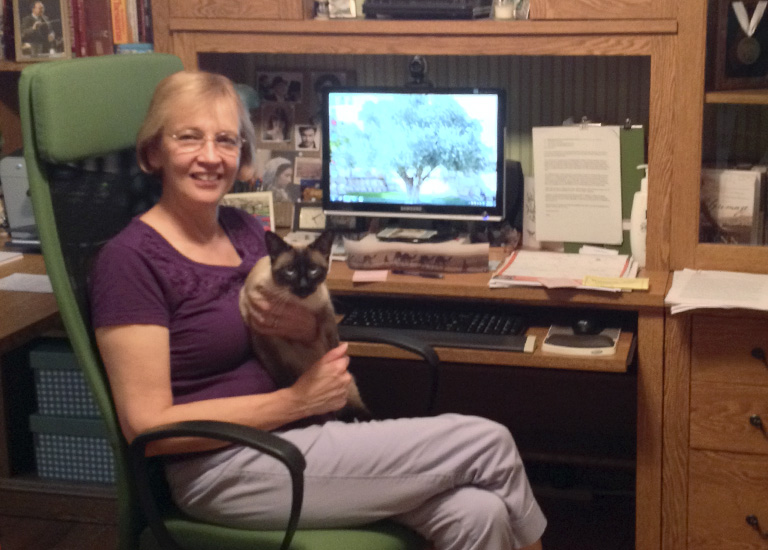 How long does it take to write a book? The answer is different for every author, but for me the process takes one year. Since I write historical fiction, I begin by doing research, a step that is truly fun for me. I love reading and digesting hundreds of facts and images and ideas about different time periods and pouring that information into what I call “story soup.” For the biblical series that I’m currently writing, I’ve read several translations of the books of Ezra, Nehemiah, and Esther, along with a variety of study notes and commentaries. These historical sources are fascinating to me, especially the archaeological discoveries from this period. One book compared the details of Queen Esther’s story in the Bible with the archaeological ruins of her palace in Susa—and the Bible proved to be amazingly accurate. But my favorite part of doing research is traveling to the places I’m going to write about—in this case, the land of Israel.
How long does it take to write a book? The answer is different for every author, but for me the process takes one year. Since I write historical fiction, I begin by doing research, a step that is truly fun for me. I love reading and digesting hundreds of facts and images and ideas about different time periods and pouring that information into what I call “story soup.” For the biblical series that I’m currently writing, I’ve read several translations of the books of Ezra, Nehemiah, and Esther, along with a variety of study notes and commentaries. These historical sources are fascinating to me, especially the archaeological discoveries from this period. One book compared the details of Queen Esther’s story in the Bible with the archaeological ruins of her palace in Susa—and the Bible proved to be amazingly accurate. But my favorite part of doing research is traveling to the places I’m going to write about—in this case, the land of Israel.
Doing research generates story ideas, and the next step in the process is creation—taking all of the raw materials and crafting them into a story. I begin by creating my characters, and I even pin pictures of how I imagine them to look on a bulletin board above my desk. This is the fun part of writing. I can let my imagination soar, using my creativity to transform historical facts and images into a story that will bring the time period to life for my readers.
I try to let the story flow freely, and I since I don’t outline the novel ahead of time I make up the plot as I go along. But I’m somewhat of a perfectionist and usually can’t resist the urge to edit what I’ve written as fast as I write it. I often begin each writing day by re-reading yesterday’s pages (which seemed so brilliant as I was writing them!) and re-working them before launching into the new writing for that day. By the time the book is finished, I’ve re-written and edited the story dozens of times.
I’m blessed to be part of a writers’ critique group, sharing my writing life with two very special women—multi-pu blished authors Jane Rubietta and Cleo Lampos. We’ve been meeting together for more than 21 years now, and as they critique my work-in-progress, our collaboration always makes my novels even better. As scripture says, “You use steel to sharpen steel, and one friend sharpens another” (Proverbs 27:17, The Message).
blished authors Jane Rubietta and Cleo Lampos. We’ve been meeting together for more than 21 years now, and as they critique my work-in-progress, our collaboration always makes my novels even better. As scripture says, “You use steel to sharpen steel, and one friend sharpens another” (Proverbs 27:17, The Message).
When my final draft is complete, the novel still isn’t finished. I always print out the manuscript so I can read and edit the printed pages. Then I type those edits back into the computer for one final rewrite. By now, my deadline usually has arrived so it’s time to send the manuscript to my publishing company. I always wish that this was the final step, that I could be finished with the project and move on to writing the next novel. It isn’t.
My editor gives the manuscript to several in-house readers and compiles their comments and observations , along with her own, into a long letter of things for me to “consider” as I re-write it one more time. I confess, I dislike this step most of all, and would skip it entirely if I could. It makes me feel the way I did in school when a project I’ve worked on for a long time comes back with a grade of B instead of the A+ I was hoping for.
, along with her own, into a long letter of things for me to “consider” as I re-write it one more time. I confess, I dislike this step most of all, and would skip it entirely if I could. It makes me feel the way I did in school when a project I’ve worked on for a long time comes back with a grade of B instead of the A+ I was hoping for.
But the truth is, we are often blind to our own faults. The characters and story are clear in my own mind because I’ve lived with them for nearly a year, but to an outside reader, there may be thoughts I failed to convey, or holes in the plot that need to be filled, or maybe a loose thread left dangling. Fresh eyes can see these flaws much more clearly that I can. So in the interest of publishing the best possible book, I’ve learned to value these comments, even when they prick my pride and feel like unwelcome criticism.
I’ve discovered that I need other people in my Christian walk of faith, too. We Americans are proud of our rugged individualism, and that attitude can carry over into our spiritual lives if we’re not careful. “Me and Jesus—that’s all I need.” But it isn’t true. I know how much my writing improves as I share it with trusted friends in my critique group, or with my editor . And the same honest sharing of my spiritual struggles can benefit me as well.
 It’s difficult for me to let someone “wash my feet,” and even more difficult to be the one to point out the need for washing to someone else, especially someone I look up to. I admire the courage it took for Nathan the prophet to confront King David after he sinned with Bathsheba. And I admire the humility and courage it took for David to accept Nathan’s rebuke, knowing that it had really come from God.
It’s difficult for me to let someone “wash my feet,” and even more difficult to be the one to point out the need for washing to someone else, especially someone I look up to. I admire the courage it took for Nathan the prophet to confront King David after he sinned with Bathsheba. And I admire the humility and courage it took for David to accept Nathan’s rebuke, knowing that it had really come from God. 
Whether it’s my manuscript or my life, I need other people to be my outside eyes, helping me stay on the right path. When I’m brave enough to pray, “Search me, O God, and know my heart…see if there is any offensive way in me, and lead me in the way everlasting” (Psalm 139:23-24), I shouldn’t be surprised when He sends a friend into my life to gently point the way back to the right path.



